Related Research Articles
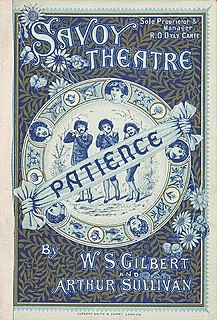
Savoy opera was a style of comic opera that developed in Victorian England in the late 19th century, with W. S. Gilbert and Arthur Sullivan as the original and most successful practitioners. The name is derived from the Savoy Theatre, which impresario Richard D'Oyly Carte built to house the Gilbert and Sullivan pieces, and later those by other composer–librettist teams. The great bulk of the non-G&S Savoy Operas either failed to achieve a foothold in the standard repertory, or have faded over the years, leaving the term "Savoy Opera" as practically synonymous with Gilbert and Sullivan. The Savoy operas were seminal influences on the creation of the modern musical.

Rosina Brandram was an English opera singer and actress primarily known for creating many of the contralto roles in the Savoy operas with the D'Oyly Carte Opera Company.

After All! is a one-act comic opera with a libretto by Frank Desprez and music by Alfred Cellier. It was first performed at the Savoy Theatre under the management of Richard D'Oyly Carte, along with H.M.S. Pinafore and another short piece, Cups and Saucers, from December 1878 to February 1880.

François Arsène Cellier, often called Frank, was an English conductor and composer. He is known for his tenure as musical director and conductor of the D'Oyly Carte Opera Company during the original runs and early revivals of the Savoy operas.

Cups and Saucers is a one-act "satirical musical sketch" written and composed by George Grossmith. The piece pokes fun at the china collecting craze of the later Victorian era, which was part of the Aesthetic movement later satirised in Patience and The Colonel. The story of the sketch involves an engaged man and woman who each schemes to sell off the other's purportedly valuable china.

The Spectre Knight is a one-act "fanciful operetta" with a libretto by James Albery and music by Alfred Cellier. It was first performed on 9 February 1878 at the Opera Comique by the Comedy Opera Company as a companion piece to The Sorcerer. The piece continued to run until 23 March 1878 and was revived by the company from 28 May 1878 to 10 August 1878 as a companion piece to H.M.S. Pinafore. The piece had a run in New York in 1880 and was toured in Britain and America.

The Willow Pattern is a one-act comic opera with a libretto by Basil Hood and music by Cecil Cook. It was first produced by William Greet at the Savoy Theatre on 14 November 1901, running for a total of 110 performances until 29 March 1902. It toured thereafter.
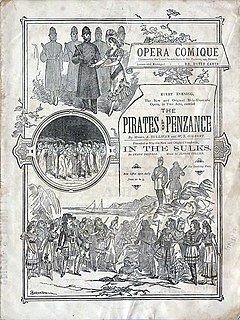
In the Sulks is a one-act comic opera with a libretto by Frank Desprez and music by Alfred Cellier. It was first performed at the Opera Comique on 21 February 1880; revived 3 April 1880 to 2 April 1881 as a curtain raiser to The Pirates of Penzance, and again from 25 April to 2 May 1881 and from 11 to 14 October 1881 as a curtain raiser to Patience. It was also performed from 21 February to 20 March 1880 at matinees with the Children's Pinafore. The piece also toured frequently from 1879 to 1882.

Mock Turtles is a one-act comic opera with a libretto by Frank Desprez and music by Eaton Faning. It was first produced at the Savoy Theatre on 11 October 1881 as a curtain raiser to Patience, then from 26 November 1882 to 30 March 1883 with Iolanthe. The piece also toured from December 1881 throughout 1882. It also toured in 1883 and 1884 and enjoyed further revivals, including a tour in 1897 with J. M. Gordon and his company.

A Private Wire is a one-act musical "vaudeville" operetta with a libretto by Frank Desprez and Arnold Felix and music by Percy Reeve. It was first produced at the Savoy Theatre on 31 March 1883 to 1 January 1884 as a companion piece to Gilbert and Sullivan's Iolanthe. The piece also toured from March to July 1884.
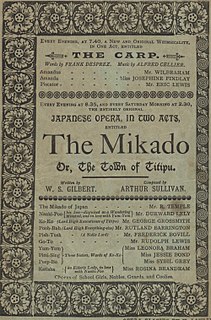
The Carp is a one-act comic opera with a libretto by Frank Desprez and music by Alfred Cellier. It was first produced at the Savoy Theatre from 13 February 1886 to 19 January 1887, as a companion piece to The Mikado. It was then revived as companion to Ruddigore from 21 February 1887 to 5 November 1887. The piece also toured throughout 1888.

Mrs. Jarramie's Genie is a one-act comic opera with a libretto by Frank Desprez and music by Alfred Cellier and François Cellier. The piece was first presented at the Savoy Theatre on 14 February 1888, as a curtain raiser to the revival of H.M.S. Pinafore. It was subsequently presented as a curtain raiser to revivals of The Pirates of Penzance and The Mikado, and then with The Yeomen of the Guard.
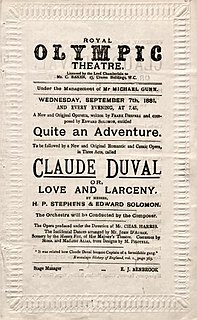
Quite an Adventure is a one-act comic opera by Edward Solomon with a libretto by Frank Desprez. The farcical plot concerns a house-guest who mistakes his hostess's husband for an intruder.
Weather or No is a one-act comic opera, styled a "musical duologue", by Bertram Luard-Selby with a libretto by Adrian Ross and William Beach. It was produced at the Savoy Theatre from 10 August 1896 to 17 February 1897 as a companion piece to The Mikado, and from 2 March 1897 to 24 April 1897 with His Majesty, for a total of 209 performances.

Old Sarah is a one-act comic opera composed by François Cellier with a libretto by Harry Greenbank.
A Welsh Sunset is a one-act comic opera composed by Philip Michael Faraday, with a libretto by Frederick Fenn. It was produced at the Savoy Theatre from 15 July 1908 and played with revivals of H.M.S. Pinafore and The Pirates of Penzance until 17 October 1908, and from 2 December 1908 until 24 February 1909, a total of 85 performances. A copy of the vocal score, but no printed libretto, is found in the British Library. The score contains all the dialogue.
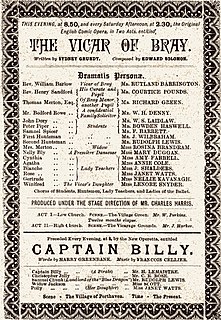
Captain Billy is a one-act comic opera with a libretto by Harry Greenbank and music by François Cellier. It was first performed at the Savoy Theatre on 24 September 1891 until 16 January 1892, as a curtain raiser to The Nautch Girl, and from 1 February 1892 to 18 June 1892, as a curtain raiser to The Vicar of Bray, for a total of 217 performances.
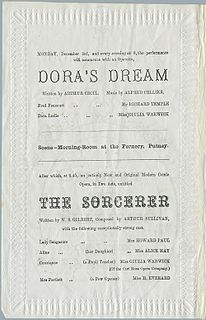
Dora's Dream is a one-act operetta, with music composed by Alfred Cellier and a libretto by Arthur Cecil.
Pretty Polly is a one-act playlet by Basil Hood, with music composed by François Cellier. The ten-minute long piece concerns the difficulties of a shy fellow who tries to use a talking parrot as a matrimonial agent.
The Outpost is an opera or operetta by the composer Hamilton Clarke with a libretto by A. O'D. Bartholeyns. The story is an adaptation of the Singspiel Der vierjährige Posten by Theodor Körner with music by Franz Schubert.